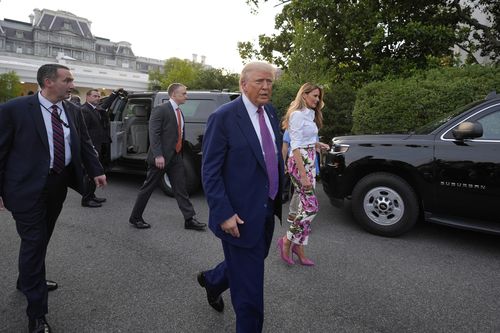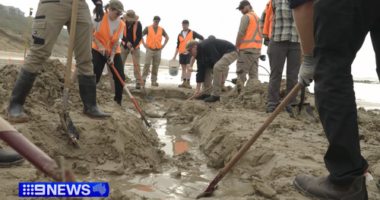Share this @internewscast.com
President Donald Trump has encouraged Iran to promptly negotiate an agreement to limit its nuclear activities as Israel commits to sustaining its attacks on the nation.
Trump portrayed the uncertain situation in the Middle East as a possible “second chance” for Iran’s leadership to prevent further destruction “before there is nothing left and save what was once known as the Iranian Empire.”
The Republican president focused on Iran while meeting with his national security team in the Situation Room to deliberate on the complex course ahead following Israel’s intense assaults, which Prime Minister Benjamin Netanyahu vowed to maintain “as many days as it takes” to dismantle Iran’s nuclear program.

“But make no mistake: We do not want an all-out war in the Middle East,” Shapiro said. “That’s not only bad for the Middle East, it’s destabilising for the globe, and it’s something that I hope will not occur.”
Israel launched blistering attacks on the heart of Iran’s nuclear and military structure Friday, deploying warplanes and drones previously smuggled into the country to assault key facilities and kill top generals and scientists — a barrage it said was necessary before its adversary got any closer to building an atomic weapon.
Iran retaliated by unleashing scores of ballistic missiles on Israel, where explosions flared in the skies over Jerusalem and Tel Aviv and shook the buildings below.
The US military assisted Israel intercept the missiles fired by Iran in the retaliatory attack.
Trump, in the hours before the Israeli attack on Iran, still appeared hopeful in public comments that there would be more time for diplomacy.
But it was clear to the administration that Israel was edging toward taking military action against Iran.
The State Department and US military on Wednesday directed a voluntary evacuation of nonessential personnel and their loved ones from some U.S. diplomatic outposts in the Middle East.
Before Israel launched the strikes, some of Trump’s strongest supporters were raising concerns about what another expansive conflict in the Mideast could mean for the Republican president, who ran on a promise to quickly end the brutal wars in Gaza and Ukraine.
Trump has struggled to find an endgame to either of those conflicts and to make good on two of his biggest foreign policy campaign promises.
And after criticizing President Joe Biden during last year’s campaign for preventing Israel from carrying out strikes on Iranian nuclear sites, Trump found himself making the case to the Israelis to give diplomacy a chance.
The push by the Trump administration to persuade Tehran to give up its nuclear program came after the US and other world powers in 2015 reached a long-term, comprehensive nuclear agreement that limited Tehran’s enrichment of uranium in exchange for the lifting of economic sanctions.
But Trump unilaterally withdrew the US from the Obama administration-brokered agreement in 2018, calling it the “worst deal ever.”
The way forward is even more clouded now.
“No issue currently divides the right as much as foreign policy,” Charlie Kirk, the founder of Turning Point USA and an ally of the Trump White House, posted on X on Thursday.
“I’m very concerned based on (everything) I’ve seen in the grassroots the last few months that this will cause a massive schism in MAGA and potentially disrupt our momentum and our insanely successful Presidency.”











